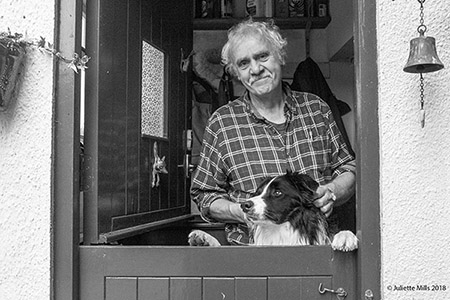|
Who we are

Chris Chapman is a photographer and film maker of distinction whose work is to be found in many private and public collections, notably the Victoria and Albert Museum, Arts Council England and the International Center of Photography in New York. |
 
Richard Westcott is a prize-winning poet and writer with a background in research-based history and extensive journalistic experience, presently a regular contributor to the North Devon Journal.
In 2018 Richard won the Stanza Poetry Competition with the following:
|
A Traditional Cure
To hold her down, that mother's tongue,
you need an iron plate
to stop her scolding - a man-made tongue
rigid and silent in its strength.
Language can be tamed and tongues
be taught. All she can do is
dribble now, around that held-firm tongue
and utter baby sounds - no scolding words.
Her head is held in an iron frame
locked tight - we hold the key
to the cage we made, which holds
that tongue of hers, to teach it
to be soft again, no longer sharp.
And to crown it all, a little bell
to tell the world what she has done.
So behold a speechless scold
who can only nod her head
and shake her little clapper.
Richard is published by:
INDIGO DREAMS PUBLISHING LTD
24 FOREST HOUSES
HALWILL
BEAWORTHY
DEVON EX21 5UU
publishing@indigodreams.co.uk
Having listened over the years to so many people (called patients) talking, Richard Westcott has found it's been a relief to talk - and listen - to himself.
His poems have popped up in all sorts of places (such as the Mary Evans Poetry Blog, the Pitt Rivers Museum, Lighten Up Online, and a wall at Exeter University), broad/podcast (East London Radio), and been listed, commended and highly commended in various competitions, including the Hippocrates, York Mix, Camden Lumen, Plough and Poetry on the Lake even winning a prize or two here and there.
He's often to be found outdoors and is blessed with a large and tolerant family to whom he talks, along with his dog, who happens to be a good listener as well, and is also a keen amateur musician (the man, not the dog).
www.richardwestcottspoetry.com
There they live much longer
Richard Westcott
Published: 26th March 2018
Poetry, 138 x 216mm, 34 pages
ISBN 978-1-910834-78-7
£6.00 + £1.50 P&P UK
Cover design
Detail from woodcut Picasso and the orchid
www.judithwestcott.co.uk
|
|

|
The protagonists of these poems extend from ancient times to yesterday; they range from the famous to the anonymous, from the real to the imagined, from the historic to the mythic. But they all shared the same fate. The medium of poetry, with its particular privileges and special liberties, offers one way to approach the frightening, almost incomprehensible and so often avoided subject of suicide. Unflinching and at times realistic, naturally and inevitably emotional but never sentimental, these poems - as varied as their subjects - acknowledge the suffering, but seek to find a measure of meaning, to achieve some understanding and ultimately sympathy for, if not kinship with, those who left so abruptly.
"It takes some courage and discipline to mount an expedition into the so-near-yet-so-far-away terrain of suicide. Neither deploring nor romanticising it, but considering with sensitivity a range of lives, each individual to its circumstances and society, these poems widen the perspective in which we can look at an act which our culture in particular finds hard even to contemplate."
Philip Gross
"Having twice awarded Richard Westcott prizes in the YorkMix competition, I was excited to read his first collection. Here is that same clear, intelligent, confident voice inhabiting a wide variety of people from history. It is Westcott's unique gift to turn these dramatic monologues into pure gold.
I loved every word."
Carole Bromley
"These poems are about thresholds, not the physical border from the outside, as a doorway into a home, but the conceptual boundary separating out one space from another. Westcott's preoccupation is with this conceptual boundary as it demarcates life from death. His interest is in this very specific juncture, in the context of suicide. He takes as his examples Primo Levi, Virginia Woolf, Seneca, Robert Fitzroy. and others. He inhabits their innerworlds, takes on their voices and contemplates their situations, their plans, and their final actions. The effect is powerful, mesmerising, and moving. But, it is the language that is most impressive. Westcott has mastered his craft, he writes as if the words themselves were utterly lucid, as if the carefully chosen words, the economy and thrust of the narrative, the rhythm were all composed of the air on a crisp spring day- all luminosity, and without any glare. It is a remarkable achievement for he inhabits a variety of voices yet possesses a uniqueness all his own."
Femi Oyebode MBBS, MD, PhD, FRCPsych
| |

